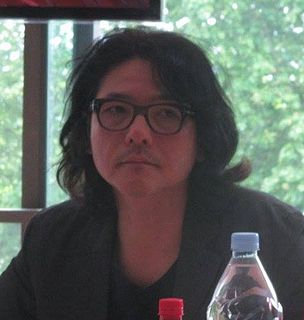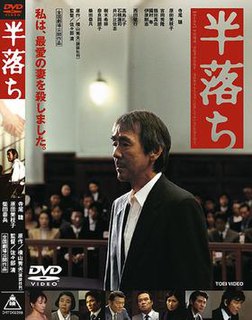
Shunji Iwai is a Japanese film director, video artist, writer and documentary maker.

Yoji Yamada is a Japanese film director best known for his Otoko wa Tsurai yo series of films and his Samurai Trilogy.
Hideyuki Hirayama is a Japanese film director. His theatrical debut was the film Maria's Stomach in 1990. He won the Directors Guild of Japan New Directors Award for The Games Teachers Play in 1992. In 1995, School Ghost Stories was a big hit and made into popular series. Begging for Love in 1998 got many awards as International press award (FIPRESCI) in Montreal World Film Festival, Japan Academy Prize for Director of the Year, Mainichi Film Award for Best Director etc. In 2001, Hirayama won Best Director Choice for Turn at the Puchon International Fantastic Film Festival. He also got several Japanese film awards for director, including the Best Director award for The Laughing Frog and Out at the 2003 Yokohama Film Festival.
Yoshimitsu Morita was a Japanese film director who was born in Tokyo.
Michiru Oshima is a Japanese composer and arranger. She works on music in wide range of areas, such as anime, films, television series, video games and concerts. She has written scores for over 100 movies, over 200 television titles, video games, various types of events, concerts, theaters, among others. Ōshima is one of the most prolific living composers for film, anime and video game. She has released over 300 CDs including film soundtracks and artist CDs. Her works include composition for Godzilla vs. Megaguirus, Godzilla Against Mechagodzilla, and Godzilla: Tokyo S.O.S. movies and scores for numerous anime television series, including Fullmetal Alchemist, Fullmetal Alchemist the Movie: Conqueror of Shamballa, Nabari no Ou, Queen Emeraldas, Xam'd: Lost Memories, Arc the Lad, and Weathering Continent. In addition to the soundtracks on Kaiju films and anime music, she has composed music for several video games such as Genghis Khan II: Clan of the Gray Wolf for Super NES, Ico for PlayStation 2, Legend of Legaia for PlayStation and its PlayStation 2 sequel Legaia 2: Duel Saga, Arc the Lad III, Deemo, Midnight Play by the company Tivola based on the art illustrations of Květa Pacovská, and an orchestral arrangement of a Zelda medley for the Wii and Nintendo GameCube game The Legend of Zelda: Twilight Princess. She was also the composer for a Japanese stage musical adaptation of the classic Hollywood film Roman Holiday. Her latest work includes the composition of several music tracks for the highly acclaimed Chinese espionage thriller film The Message and a 2017 Chinese mystery thriller film The Devotion of Suspect X (film).

Junji Sakamoto is a Japanese film director.
Kazuyuki Izutsu is a Japanese film director, screenwriter and film critic.
Yoshio Harada was a Japanese actor best known for playing rebels in a career that spanned six decades.

Kei Kumai was a Japanese film director from Azumino, Nagano prefecture. After his studies in literature at Shinshu University, he began work as a director's assistant.

Kōhei Oguri is a Japanese film director and screenwriter.

Half a Confession is a 2004 Japanese film directed by Kiyoshi Sasabe. It was chosen as Best Film at the Japan Academy Prize ceremony.
The Tanizaki Prize, named in honor of the Japanese novelist Jun'ichirō Tanizaki, is one of Japan's most sought-after literary awards. It was established in 1965 by the publishing company Chūō Kōronsha Inc. to commemorate its 80th anniversary as a publisher. It is awarded annually to a full-length representative work of fiction or drama of the highest literary merit by a professional writer. The winner receives a commemorative plaque and a cash prize of 1 million yen.

Kazuo Hara is a Japanese documentary film director. After dropping out of university to work at a special education school, he made his 1972 debut work Goodbye CP about a group of individuals with cerebral palsy. He won the award for Best Director at the 12th Hochi Film Award and at the 9th Yokohama Film Festival for The Emperor's Naked Army Marches On. That film also earned him the Directors Guild of Japan New Directors Award. In 2017 he released the documentary Sennan Asbestos Disaster which received the 2017 Audience Award at the Tokyo Filmex International Film Festival and the 2017 BIFF Mecenat Award at the Busan International Film Festival. His documentary works often depict people who push against the boundaries of propriety and obedience in Japanese society.
Yōichi Higashi is a Japanese film director. He began his career working on documentaries at Iwanami Productions but, after going independent, turned to fiction film. He won the Directors Guild of Japan New Directors Award for Yasashii Nipponjin in 1971, and then the award for Best Director at the 17th Hochi Film Awards for The River with No Bridge.
The Directors Guild of Japan New Directors Award is given annually by the Directors Guild of Japan to a new director of a film released that year who is considered the most "suitable" for the award. The winner is selected by a committee formed of DGJ members. All formats—feature film, documentary, television, video, etc.—are eligible for consideration. In some years when there was no apparent winner, the Guild only issued a "citation" or did not give out the award. Multiple awards have been given in other years. With a long history, many of Japan's major postwar directors have received the award, including Nagisa Ōshima, Susumu Hani, Yoshimitsu Morita, Masayuki Suo, Takeshi Kitano, and Shunji Iwai.
Akihiko Shiota is a Japanese film director and screenwriter.
Chirusoku no Natsu (チルソクの夏) is a 2003 Japanese film directed by Kiyoshi Sasabe.

The Japan Institute of the Moving Image, formerly known as the Yokohama Broadcasting Technical School, is a Japanese film school and university. It was founded in 1975 by film director Shohei Imamura.
Toshinori Omi is a Japanese actor.
The 26th Yokohama Film Festival (第26回ヨコハマ映画祭) was held on 6 February 2005 in Kannai Hall, Yokohama, Kanagawa, Japan.








